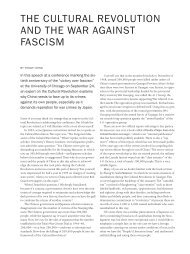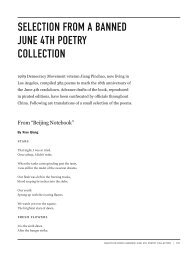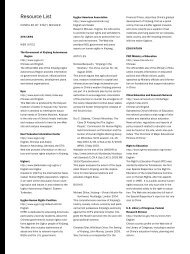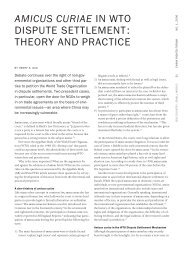STATE SECRETS: CHINA'S LEGAL LABYRINTH - HRIC
STATE SECRETS: CHINA'S LEGAL LABYRINTH - HRIC
STATE SECRETS: CHINA'S LEGAL LABYRINTH - HRIC
Create successful ePaper yourself
Turn your PDF publications into a flip-book with our unique Google optimized e-Paper software.
The all-encompassing, circular,<br />
and vague classification of<br />
information and criminalization<br />
of disclosure and possession of<br />
that information—with or without<br />
knowledge of doing so—creates a<br />
chilling effect on the culture of<br />
human rights.<br />
B.<br />
Impact of the System on Human Rights<br />
24 HUMAN RIGHTS IN CHINA <strong>STATE</strong> <strong>SECRETS</strong>: CHINA’S <strong>LEGAL</strong> <strong>LABYRINTH</strong><br />
The state secrets framework is broad in both implementing structure (multiple<br />
bodies at all levels of government have responsibilities and authority on state<br />
secrets) and substance (large categories of information are classified or can be classified).<br />
The PRC falls far below the international standard on the protection of the<br />
right to freedom of expression and information due to the comprehensive amount<br />
of information that can be classified, the subjective and arbitrary means by which<br />
information is classified, and the serious criminalization of disclosing that information.<br />
Furthermore, where the international legal framework places a burden on the state<br />
to show that there is a legitimate need to restrict information, 100 the emphasis in<br />
Chinese domestic law places the burden on the individual to protect classified<br />
information even if it has not been already designated as such through the state<br />
secrets bureaus. While the delineated purposes enumerated in Article 1 of the State<br />
Secrets Law tie in somewhat with legitimate restrictions of the right to freedom of<br />
expression under the ICCPR, the provision that state secrets include “other matters<br />
that are classified as state secrets” by the NAPSS 101 allows numerous bodies at all<br />
levels of government the ability to classify any information they deem necessary as<br />
state secrets.<br />
The impact of this legal and enforcement framework suggests that not only are<br />
individuals impacted by the serious criminal sanctions levied for “disclosing state<br />
secrets,” but the public interest is undermined where there is so little transparency<br />
and freedom of expression is violated. The all-encompassing, circular, and vague<br />
classification of information and criminalization of disclosure and possession of<br />
that information—with or without knowledge of doing so—creates a chilling<br />
effect on the culture of human rights, in particular on three specific areas critical to<br />
protection for human rights: the rule of law, transparency and accountable governance,<br />
and participation of civil society.







